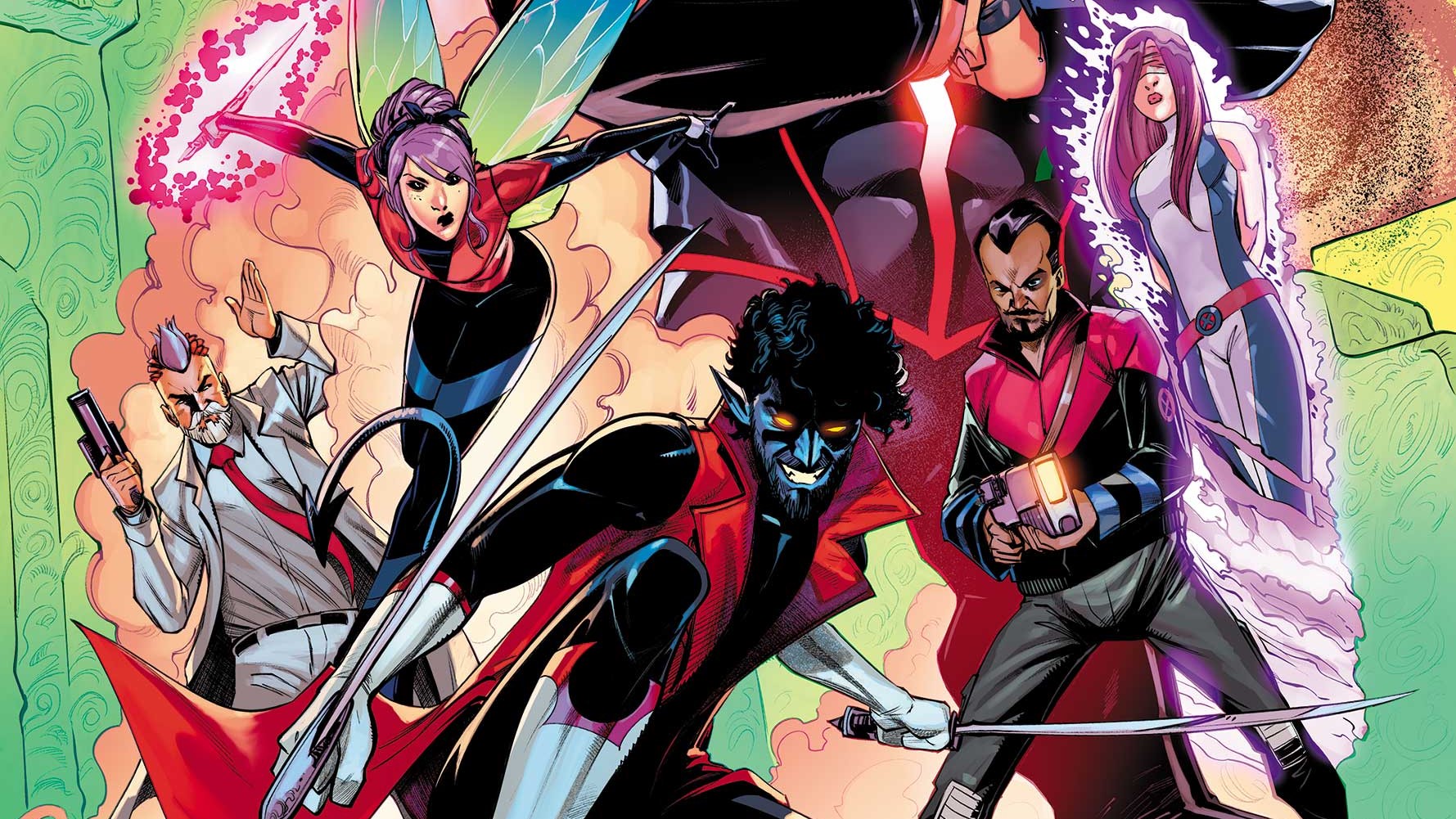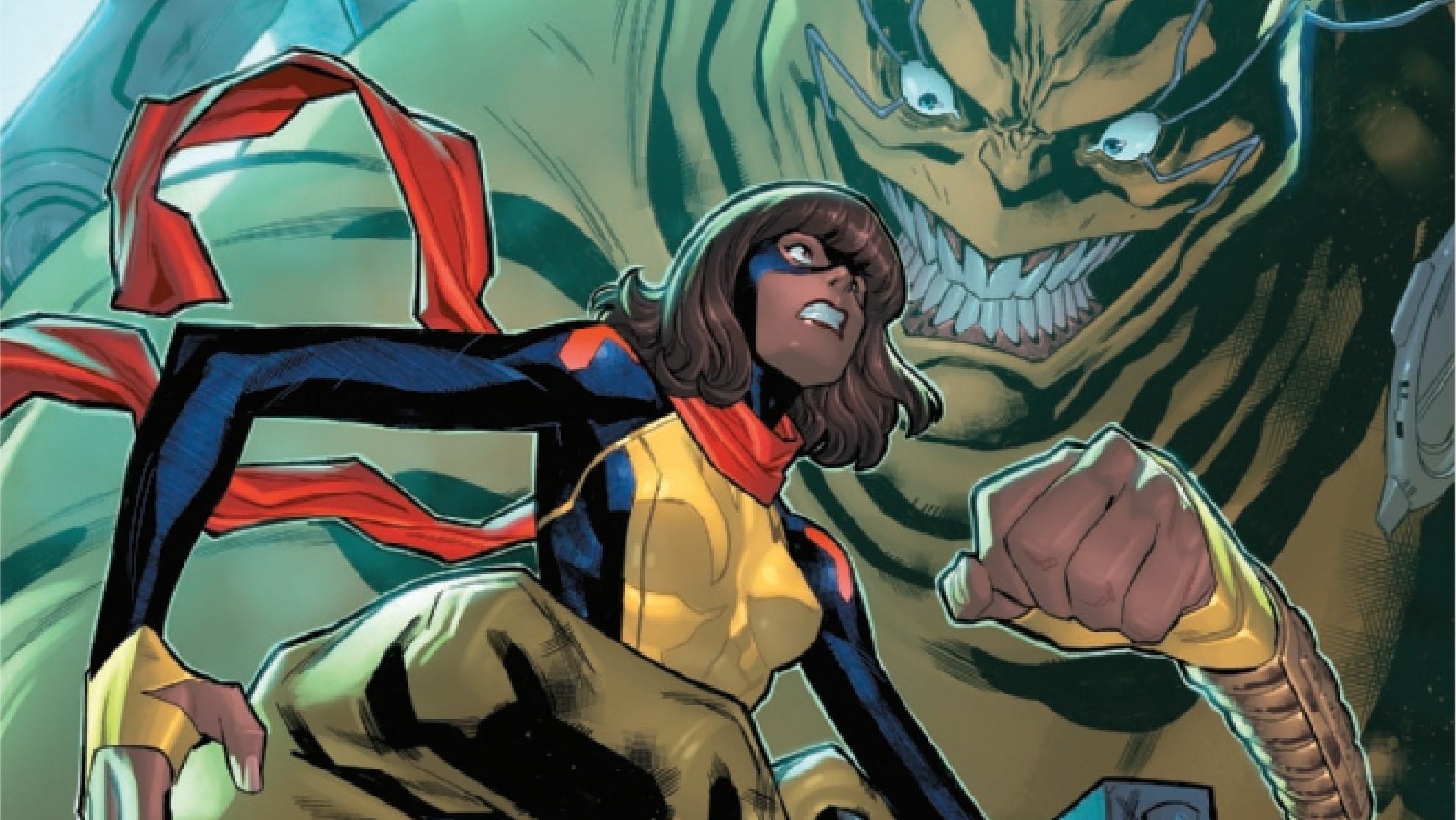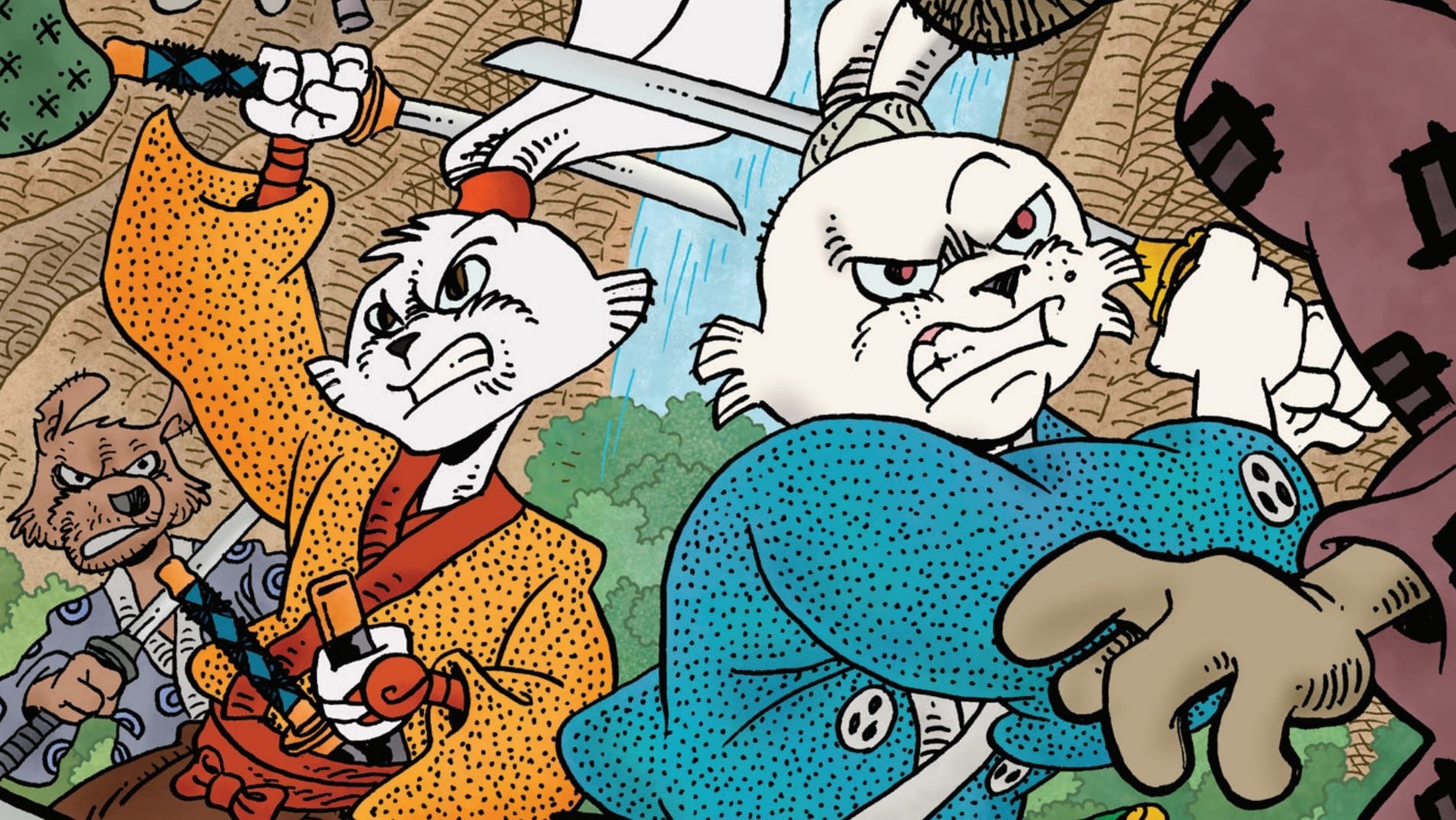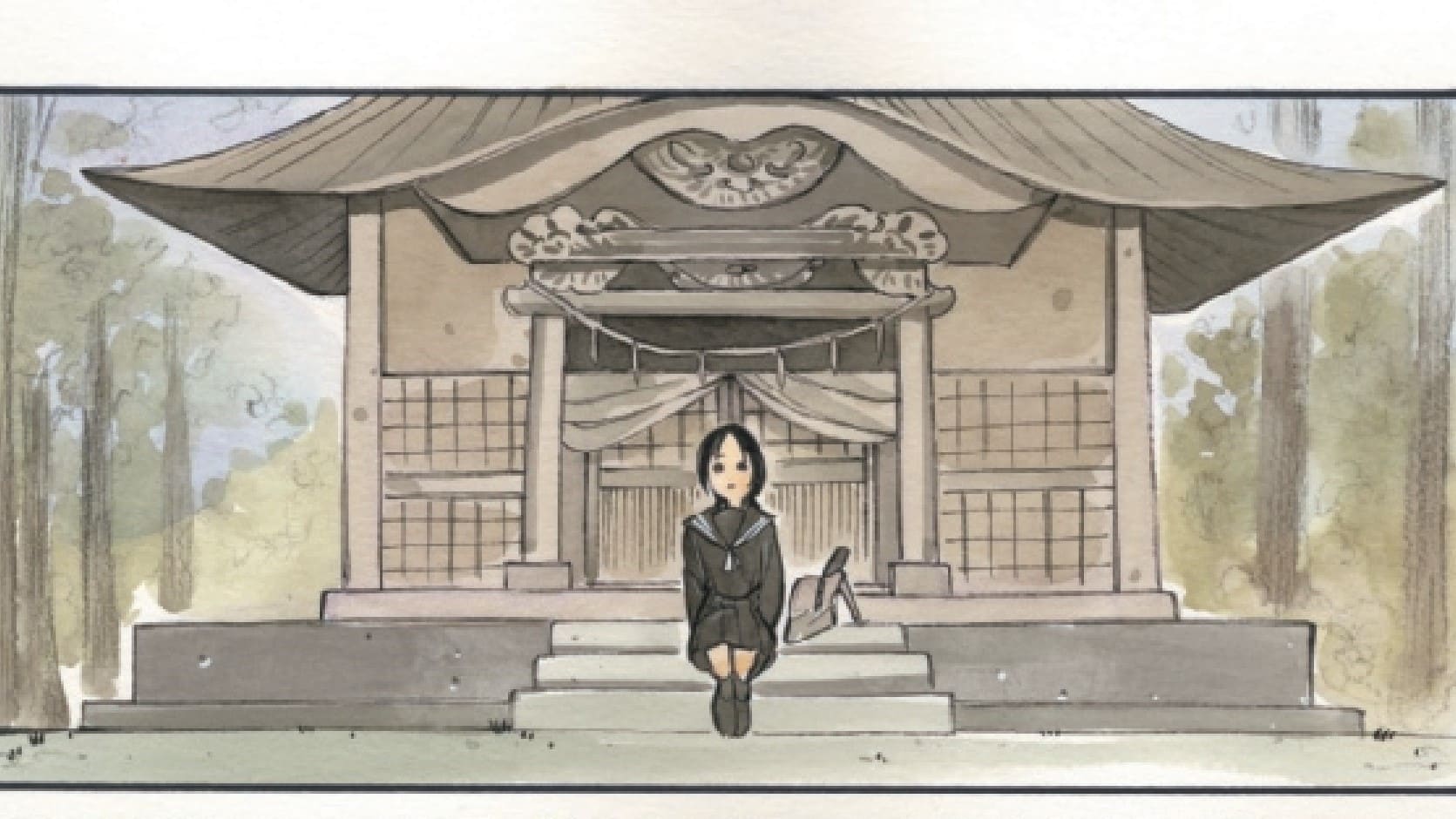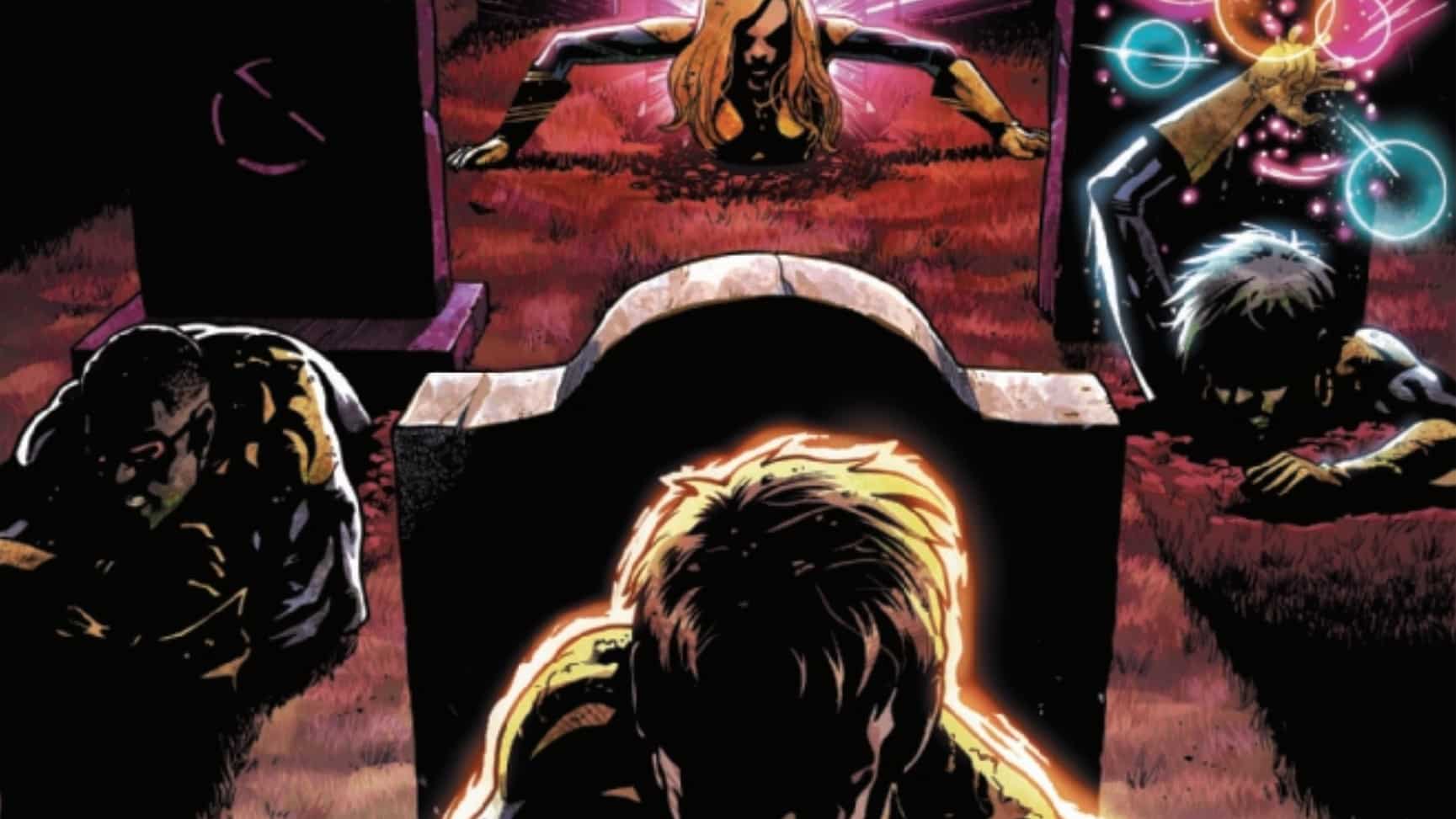The Way of X has been discovered, and that way is the Spark. Now the Spark must be protected, and out of a station located on the Astral Plane, tucked inside Legion’s mind, Nightcrawler has formed a new policing force to keep the Spark alive. The Legion of X’s first major mission? Arakko’s missing a deity. Legion of X #1 is written by Si Spurrier, drawn by Jan Bazaldua, colored by Frederico Blee and lettered by Clayton Cowles.
Armaan Babu: It looks like we can’t quite escape stories of gods from other planets who are hiding out on Earth, Ari, but of course, there’s a lot more going on here than just that. This is a comic about police, and what it means to keep the law in a land where the law is so loosely defined, on an island where extraordinary circumstances are part of the everyday. The book’s chosen focus has it on thin ice, but while there are some cracks in this first issue, nothing’s completely fallen through. What are your first impressions of this series so far?
Ari Bard: Well, I think you could fairly sum up Way of X as Spurrier’s journey to try and interpret the laws created when Krakoa was formed. The three founding laws were made, everyone waited an extended period of time, and then they asked, “We should probably figure out what these really mean, huh?” The problem comes when you consider the fact that Way of X didn’t do such a great job at interpreting these laws. There was a lot of misunderstanding, poor characterization, poor handling of trauma, etc. that really obfuscated any sense of understanding among mutants and Nightcrawler who is leading this effort.
Now we have Legion of X, where the job is to enforce the law, but the problem is we never really settled on good interpretations. Even the data page early on in this first issue feels like a poor attempt at throwing something together that re-interprets the laws in a better way. Long story short, mutant cops enforcing a poorly written set of vague laws feels a little too familiar and doesn’t leave me with the best feeling. That’s not to say it’s necessarily a bad thing. Discomfort can be a good thing to invoke when it is used to make a larger point, but I’d argue Spurrier doesn’t seem to care about doing either of those things, or if he does, it’s executed poorly.
The Tower

Armaan: So right off the bat, we have two very interesting things. First, right there in the first panel, we’re reminded of that mysterious, as-yet-unexplained tower that was first explored in X-Men #7. A place you can only get into via teleportation, that seemed to have been specifically made for Nightcrawler, it received a hell of a set up, but as yet, no follow up. Opening the issue with an image of that tower seems like its setup might not be entirely forgotten after all — though we’re still a long way from getting any answers about it. It’s also fun starting this new series with the tower, if you think back to the tarot cards that were a big deal earlier in the Krakoan era: the tower represents change, and great upheaval, and with Nightcrawler’s new Legionaries, that’s certainly what we’re getting here.
The other thing, just a little bit into the issue, are the titles we get right there in the credits page – “The whole of the law” and “Do what thou wilt” which, as Rob Secundus pointed out to me, is a direct reference to Aleister Crowley’s brand of Satanism. We may have shifted to a book about religion to a book about policing, but it seems like religious ideas are still being played with, here.
Ari: We are promised a great upheaval, that is for sure, but I am not sure that’s really what we get. I’m always happy to see promises of great change and previous symbols revisited in new contexts, but everything still feels disappointingly familiar and unsettlingly human. I suppose it shouldn’t necessarily be unexpected, since everyone on Krakoa lived a lifetime, sometimes multiple, in a human society with human norms, but Krakoa was supposed to evolve beyond that. Mutants spent decades, arguably centuries, in civilizations that oppressed them for who they were and what they could do. Now they have the opportunity to create their own civilization, with all of the hope, responsibilities, and imagination that may entail and they start from the oppressive baseline of where they came from. Perhaps this is intentional, and the point of the entire X-men line is to show how civilizations can evolve past the shackles that bound them over time, to which I’d argue that it’s been a line-wide effort over two years with very limited innovative gains. Is this progression or regression? I’m not convinced of the former here.
As far as religion goes, I think it’s very natural that it still has a role here. The very first laws across many ancient societies often came from the divine or at least had a divine component to them. There’s also the whole idea that many mutants have seen themselves as gods over humanity and some of them still do. Have gods ever really needed to follow a rule of law? How can those two ideas be reconciled? The interplay between religion and law is probably the overall theme I’m most interested in this series, and I hope Spurrier explores it with nuance.
Armaan: Currently, I am fascinated with Arakko’s approach to religion, but we’ll get to that in a bit.
What I am enjoying in this comic so far is the weirdness we’re thrust into. A police station inside the mind of a reality warper with hundreds of differently powered personalities, in a place that you can only enter through a gateway on Mars. These are the kinds of things that make comics fun, and I’m enjoying Frederico Blee’s colors on this — the brighter vivids, the acidic strangeness of the astral plane that surrounds everything.
As someone who was also a fan of the Legion-starring X-Men: Legacy run, it’s also great to see Blindfold finally resurrected. She’s been missed — though her unique speech patterns, the constant self-interruptions and apologies…that’s been a little less missed. I’d say they take some getting used to, but I’m not sure if I ever did manage it. Still. She’s back, her and David get to grab a little happiness without the threat of a doomed destiny over their heads, I’m happy.
Ari: Blindfold’s resurrection and moments with Legion make for great scenes, although right now this subplot does feel a little disconnected from the core of the book. As you touched on, however, the unique speech pattern, which by itself I do not mind, combined with the lettering quirk of having anything muttered under one’s breath or at a lower volume be a smaller font size in all lower case, makes for a terrible read. There are some speech bubbles where the lettering tries to switch back and forth so much as self-interruptions and uncertainties occur that it becomes near unreadable.
Armaan: Spurrier has a unique take on character voices. I’ve been reading a lot of his X-Men-related stuff in the lead-up to this series, and one thing I’ve noticed is that Si Spurrier has a certain obsession with labels. As I mentioned in my piece catching people up for this series, a lot of characters under his pen can be reduced to those labels. That’s not to say that characters he writes don’t have their own nuances, but every so often, you’re going to see an X-Men character whose voice feels out of place because Spurrier chose the wrong label to focus on. It’s why Nightcrawler is written as a man struggling with his faith more than anything else, why so much work is going into Blindfold’s stutter when she’s not with David, why Pixie’s going to have as much Welsh slang as can be crammed into a dialogue bubble, or why Storm feels uncomfortably caricatured.
Ari: You’re absolutely right and I think the problem isn’t that Spurrier chose the wrong label to focus on, but that he chose labels to focus on at all. Labels that describe pieces of one’s identity are important, but it’s equally important to recognize that they are pieces of a whole person. The phrase “one-dimensional character” gets thrown around a lot, but it’s an apt way to describe how Spurrier is writing a lot of these characters. Sure there are going to be scenarios where certain labels or pieces of one’s identity are more relevant than others, but it’s always fluctuating, and in this book especially, you can feel almost every existing character getting flattened into one specific mold. It becomes even more of a problem when the longer a character has existed, the more complicated all of the nuance becomes, and especially for a character like Storm who has had a long history combined with identities that all too many of her writers have not shared, missteps like her voice in Legion of X #1 need to be called out.
Armaan: Yeah. What I have zero complaints about, though, is the art. I spoke about Blee’s colors earlier, but I also have a lot of appreciation for Jan Bazaldua’s work. There’s a lot of style here – the new Legionary costumes, Nightcrawler’s general look in pretty much every panel he’s in, and I want to note special appreciation to Orra Serrata’s cape — it’s not easy to make a slug on an eyeball look regal, but Bazaldua’s done a magnificent job there.
Ari: The colors, as you said, are gorgeous. In an issue where the pacing was sometimes reminiscent of Nightcrawler teleporting all over the place, Blee’s colors help thread everything together by using distinct but aligned palettes for Mars, The Altar, Krakoa, and the seedy bar Juggernaut and Forgetmenot went to that one time. Especially when there’s this much weirdness, as you said, it’s helpful to keep everything connected in some way.
Speaking of weird, you’re right and there’s a lot of that. Like, you would think you’d want a police headquarters to be a little more accessible right? Or maybe not. I’m not sure, but the whole thing feels a little inefficient. It’s funny because in my mind, Spurrier has created a tornado of weirdness. In the eye of the storm is this police station where everything about it is frustratingly mundane and human, but as we spiral outward, we’re bombarded by the high-speed winds of the eccentricities of both The Altar and Arakko, which give all of the creators a whole sandbox of weird to play with before mellowing out a bit more as we get further away from those two locations.
Another God Bites the Dust

Armaan: Speaking of Arakko, it feels like a lot of the X-writers are having a lot of fun playing with this strange new sandbox, and Legion of X is no exception. While, so far, our best look at Arakkii culture is coming from X-Men Red, we get some very interesting insights into their approach to religion, as explained to Nightcrawler by his Arakkii counterpart — Orra Serrata, the Witness, and amongst her many other titles, holder of the Chair of Law.
Before we dive into deity talk, I just want to say — I love her design. A throned slug atop a giant eyeball, whose power is implied to be the ability to wipe someone from existence by beholding them. Arakkii powers are so over the top, so weird, and often, very overpowered. I’m fascinated with it all, so I appreciate this book devoting a significant chunk of its pages towards giving us a more in-depth look at how Arakko works.
Ari: I definitely agree, there are some insights here that are quite valuable, particularly the data page on Orra Serrata’s seat on the Great Ring. I will say that as a STEM person, this data page, and the development of new material in the context of the X-Men era as a whole, feels like everyone just loves initializing a whole bunch of variables at the beginning so that people can define them later. It’s a handy process that can sometimes make things feel like they were there the whole time even though they were empty and undefined for most of it.
In that sense, the four definitions for Orra’s single seat makes me roll my eyes a bit. Her design, however, is phenomenal. In addition to everything you’ve already said, I’d like to see more about Arrakkii fashion, because I think all of these unconventional character designs could lead to an interesting discussion about the value of choosing and incorporating things you wear as part of your physical body because with the Arakkii, sometimes you can’t tell which is which.
Armaan: Something we’re constantly running into with the Arakkii is this: things are more complicated than they appear. Considering how old Arakkii culture is, and how alien they feel, there’s bound to be a lot of nuance in their culture that are hard to understand until you’ve spent more time with them. I’d love to know what the guidelines for Arakkii characters are, because so far, across books, every new character I’ve seen feels similarly strange and unfathomable.
Orra introduces Nightcrawler to her people’s approach to religion. Arakko has not had the best of relationships with gods — “preening, squabbling things that leeched our faith and gave us nothing.” Any god seeking dominion over the Arakkii people is issuing a challenge to them, and no challenge on Arakko goes unmet. The Marvel Universe has more gods than Arakko knows what to do with, and every one that wants their worship is challenged in the arena. So far? It looks like none of Marvel’s gods are up to the challenge. Gods need to prove themselves — faith doesn’t seem to be a part of the equation.
It does call to mind a recent Eternals issue, where Ajak, unable to communicate with her god, decides it’s time to beat answers out of him. In a universe where gods can be summoned, it would appear that faith has its limits. Which is, in a way, an interesting challenge for Nightcrawler. Whether it’s the Catholic idea of God, or Kurt’s newfound Spark — neither of them are easily summoned, or challenged. They’re matters of faith.
What do you think of this more violent, direct approach to religion, Ari?
Ari: As its own mechanism, I love it. In a society where a majority of individuals have abilities that make them appear as gods to humans, those who might wish to be considered as gods to them may need a little more burden of proof, yeah? I love that gods need to prove themselves and that faith needs to be earned.
The problem is that within the context of this era of X-Men it really just makes everything seem all the more unimaginative. Arakkii society of one of a very small number of rock-solid pillars, and it lives by it. It is simplistic, not because it is less interesting, but because it has few core parts. I’m sure more will get filled in, but right now the details across all of the books appear to be in the design over the substance. On the other hand, we have Krakoan society, which is still looking for their creed of faith and claims to be founded on three primary pillars, and yet really models itself after human society. Looking at Krakoa, it’s always been more of a modern country with fewer rules than a new society with different ones.
This worries me because neither societies are rooted in extremely exciting places. Neither are rooted in values wholly unfamiliar, opposite, or more complicated than what we might imagine. Sure there’s a ton of room to play with nuance, but when the two cores stem from such common places, how unfamiliar could their branches of growth possibly reach? This is especially true now that we’ve seen Krakoa take on remarkably human approaches to economic trade and sustainability, government structure, law enforcement, espionage, and more. As you’ve said, there’s bound to be a lot of nuance to Arakkii culture, but this roundtable of creators has now had the opportunities to create two lasting, brand new civilizations from the ground up, and their starting points appear bewilderingly superficial.
Armaan: I mean, that’s where the Spark comes in, isn’t it? Always trying something new. When you think about it, it’s definitely how the X-gene seems to be working. So few mutants have the same powers, evolution is constantly trying to bring something new to the table. But where the people of Arakko were shunted off to another dimension to figure out their own version of society, mutants have, up until Krakoa, largely been living under the thumbs of humanity, forced to live by their norms. It’s not until Krakoa, really, that they’ve had a chance to do something new…and ideally, the Spark would inspire that.
But there’s also the nitty gritty to deal with.
The problem Orra brings up is that the Arakki were approached by an apparent god of mischief (yes, I’m deeply hoping for a Loki crossover), who fled when issued a challenge to prove themselves. Kurt is tasked with bringing a god in, and Zsen the Weaponless is assigned to aid him in bringing this matter to a quick resolution.
Ari: I am also hoping for a Loki crossover, even though there appears to be a different god of mischief in our midst, as revealed to be Mother Righteous. Now, perhaps this is not who Nightcrawler is looking for, but all signs point to mischief when someone introduces themselves as a humble trader and advisor to beings who can warp reality. Nevertheless, I’m hoping for a “There can only be one” moment here between Mother Righteous and the Norse god of mischief himself.
As for Weaponless Zsen, I am intrigued by the further development of Arakkii citizens who are considered weaponless. On one hand, we have the Fisher King in X-Men Red who, as far as we know, has no abilities at all, but it appears that any mutant abilities not considered valuable in combat is also not considered to be a weapon, meaning that there are many “weaponless” individuals in Arakkii society. Its appears that she’ll be a fascinating companion that will simultaneously challenge Nightcrawler with her surprising familiarity with Catholic priesthood and its practice of celibacy (wild fact to know off the top of your head after briefly interacting with humanity I’d imagine), and overall determination to prove herself while having a very useful mutant power that just can’t do much in a fight.
As far as the Spark goes, I wish I could be as hopeful as you Armaan, but when the first act of the Spark is mutant cops, call me a bit skeptical on how original this evolution may be.
Armaan: Y’know, you got me there. You’ve also provided the perfect segue to talking a bit more about our mutant cops, and how this turns out in practice.
Among Us

Armaan: A missing deity isn’t the only case that the Legionaries have on their books. While Nightcrawler heads to Mars, we see two investigations down on Krakoa. The lesser known mutant ForgetMeNot and non-mutant Juggernaut partner up to investigate a steam-powered mutant who broke the Murder No Man Law. At the same time, Lost and Pixie team up to investigate someone known as the “Skinjacker” — a being who is possessing mutants and using them for unexplained but gruesome ends.
We seem to have opposing ends of a policing spectrum, here. In ForgetMeNot (whose sad but incredibly useful power is that people forget he exists the moment they look away from him) and Juggernaut, we have spying and brute force. ForgetMeNot is the ultimate infiltrator (as jovial as he may be), and it’s hard to imagine more of a blunt force instrument than the Juggernaut himself.
On the other hand, we have Lost and Pixie, taking a more compassionate route. Lost, especially, is upholding one of the new interpretations of Respect This Sacred Land that I enjoy the most — that law refers to more than just the ground mutants walk on. Krakoa is mutants themselves, and to reduce them to things, to take away the power of their consent — that’s a sin. Sir Terry Pratchett’s books maintained that treating people like things is the only real sin, so I do like how this bit was handled. If we have to have mutant cops, I want to see them choosing things that make their jobs harder, because it’s the right thing to do.
What do you think of how these investigations went down?
Ari: The Skinjacker investigation appears relatively ongoing, and it is going to need to reach a conclusion before I can determine if there are any redeeming qualities to mutant cops, but Lost’s words with Spike and Pixie’s encouragement back at the Altar were the best parts of the issue for me, as brief as they may have been. That being said a good actor in a poorly designed system is still just that, and characters like Pixie and Lost can be used to illustrate the complexities of filling such roles.
The problem is that there are too many superhero books already about good actors in a flawed system. There are too many books about the fact that despite those who have powers that can change the world, there are no redeeming qualities to the way things are and the different methods heroes can take to still act in broken systems. But this is not how it had to be. These creators had the chance to make a new system, one that wasn’t flawed or certainly wasn’t as flawed, and thats exceedingly rare. One might argue that even if the creators of this line could imagine a perfect society, that it’s be boring and there’d be nothing to write about. I’d argue that we already know what human society is like and how people within that system operate. We see it all around us, so why don’t they try to imagine something better, perfect, and completely unique and see what problems arise then? Now that would be interesting.
I see some redemption in the job description of a detective, even if the case we saw with Juggernaut and Forgetmenot had relatively little value for me and has the potential to really go south depending on the fate of the criminal they brought in. These two beat cops didn’t have much to offer in their storyline other than formally introducing me to Forgetmenot, whose quality of life seems incredibly sad on an island that’s supposed to be a paradise.
Armaan: One thing that bothers me is that Nightcrawler is on the Quiet Council. He’s not just interpreting the laws, he has an active hand in making them. Heck, his was the voice behind one third of those laws — Murder No Man — and I’m not sure how I feel about someone who creates the law also being the one who ensures it’s enforced…not to mention, his vote counts significantly when someone is sent to the pit. It’s a bit like someone in the Supreme Court also in charge of Homeland Security. We all love Nightcrawler, but that’s a lot of power to give anyone.
I have no idea where all this is going, but I hope that that’s something someone brings up, soon. This issue brings up a lot of things — we haven’t even gotten to Legion waltzing into a Quiet Council meeting to unceremoniously tell Warlock his father is dead. David’s hypocrisy rubs me the wrong way here (though it feels like it’s meant to), as David doesn’t seem to have any compassion for Warlock’s grief, but turns right round on his father Xavier to tell him that this kind of news needs to be done in person.
That aside, though — Nimrod showing up to attack the Technarchy feels pretty significant, though for the life of me I couldn’t adequately explain how. We know that, millenia into the future, humanity is considering joining the Technarchy, that they’re somehow the ultimate threat to mutantkind, but what does it mean that Nimrod’s attacking them here in the present? What do you reckon?
Ari: Separation of powers doesn’t seem to be something mutants have decided to take from human governments which is a bit totalitarian, but I’m sure they have their reasons. Nightcrawler does have a little too much power, especially for someone also going through large crisis of faith and purpose.
It’s really difficult to ruminate on what Nimrod’s attack might mean at this point in time, when I feel like we aren’t given all that much. The news about Magus is delivered rather quickly and callously in a way that makes me feel like it may be handled in another book, but despite that, I’m going to give David a bit of a pass here. It’s always hard to deliver news of monumental loss, and I can forgive him for wanting to be direct about it. Sure, it was insensitive to ruminate on the impact of a techno-organism leaving a psychic imprint immediately after, but given David’s own experience with loss and general mental state, I’m not sure it’s something out of the realm of expectation. I suppose I don’t really see David standing up to his father as hypocrisy but rather standing up for his own decision to try his best to be compassionate while indirectly trying to empathize with Warlock, as the wording makes me feel like David’s experienced a situation where he was notified of his father’s death through a more insensitive medium, though I don’t know enough X-Men history to be sure. It’s far from perfect, but I do get the sense that David is trying here, otherwise why bother coming at all?
Armaan: David is trying, I will give him that, and I can’t lie, I will always enjoy someone giving Charles Xavier a dressing down, even if I do feel it’s a bit unearned.
David is trying so hard not to be his father’s son, and nowhere is that more clear than in the very existence of the Altar. Where Charles Xavier holds his secrets close to his chest, and keeps his mind guarded at almost all times with that helmet of his, David has literally opened his mind up to make a safe space for any mutant to visit. You really don’t get more open-minded than that.
But, to paraphrase Sir Terry Pratchett again, there’s a danger to having an open mind — someone’s always going to come along and try and put something in it. In this case, it’s a rather stylish someone, calling herself Mother Righteous. Is she our wayward god of mischief, or something else entirely? She’s certainly got the style of mischief about her.
Either way, though, I’m willing to bet the temptation she’s offering David — power or glory — is a misdirect. David’s not the most trusting of people, but I’m looking forward to finding out what her deal is.
That’s a strength of the issue for me. It’s setting up a lot of mysteries, more than any single issue rightly should, but I find myself hooked all the same.
Ari: I am mostly in agreement in that I think this book is a series of hits and misses. The biggest difference is the hits seem to largely be hints at things to come, while the misses are openly displayed in front of us on the page. I certainly hope Spurrier and the team can capitalize on the former.
Altared Records

- It’s unlikely we’ll ever see this, but the challenge fight between a giant eye that sees people out of existence and a man who can summon gods must have been a truly awesome, metaphysical kind of bout.
- ForgetMeNot has gotten a hell of a handsomeness upgrade from his usual slightly hopeless, receded-hairline amiable doofishness.
- Wait, hold on a minute. Why doesn’t Juggernaut’s helmet stop the psychic effect that keeps people from remembering ForgetMeNot, if neural filters do the trick?

